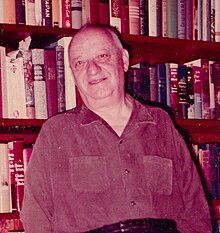Bohdan Pawłowicz
| Bohdan Pawłowicz | |
|---|---|
 |
|
| Born | Bohdan Pawłowicz 2 February 1899 Warsaw, Poland |
| Died | May 28, 1967 (aged 68) New York State, US |
| Occupation | scout, military man, writer, journalist, emigration officer, radio broadcaster, professor |
| Language | Polish, English, Portuguese, Russian |
| Citizenship | Polish, American |
| Period | 20th century |
| Notable works | Franek na Szerokim Swiecie. Przygody na morzu i lądzie; Pionierzy; Przez ocean do Polski walczącej; Krew na oceanie (English version: O.R.P. Garland in convoy to Russia) |
| Notable awards | Medal Niepodległości, Krzyż Walecznych, British War Medal 1939-1945, Ordem Barão do Rio Branco |
| Spouse | Wanda Salmonowicz h Orla (Szaszor) (1901-1987) |
| Children | Leszek Kazimierz (1925-2008) and Hanna Antonina (1928-) |
| Website | |
| http://bohdanpawlowicz.org/biographies/bohdan/ | |
Bohdan Pawłowicz (February 2, 1899 - May 28, 1967) was a Polish writer, journalist, radio broadcaster and a Polonia activist. He was also a scout, an emigration officer, a military man, a professor of Polish literary history and a globe-trotter.
Bohdan Pawłowicz was born on February 2, 1899 in Warsaw. Poland was then partitioned. His parents were Kazimierz Pawłowicz, a ceramic engineer from Kalisz, and Helena Bożeniec-Jełowicka As a young scout, he joined Piłsudski's Polish Legions during World War I and later, as an officer in the Polish Military Organisation (Polska Organizacja Wojskowa), he took part in the Polish-Soviet War, during which he was wounded and moved to the reserve. He then became responsible for Polish emigration issues. In 1923, he joined the Polish Navy and sailed to South America on the Lwów, the first Polish ship to cross the Equator. In Curitiba, Brazil, he met and married Wanda Salmonowicz (Szaszor). He brought her to Warsaw, where they had two children: Leszek and Hanna. Between the two World Wars, he finished his studies at the Warsaw School of Fine Arts and mingled with the Arkadia group of literati in Kazimierz, Warsaw. He also worked for the Maritime and Colonial League, and as an emigration inspector was sent on numerous trips on different ships around the world. In the 1930s, he played a very active role in the Polish Radio - in Warsaw, Lwów, Łódź and Toruń.
The outbreak of World War II (September 1, 1939) caught Pawłowicz on the maiden voyage of the MS Chrobry. The ship, already on her return trip, docked in Recife, Brazil, from where she was summoned to serve the British Royal Navy. Unable to return to occupied Poland, Pawłowicz joined the Polish Government in Exile, first in Paris, then in Scotland and London, where he served the Polish Navy Directorate (KMW) as Head of the Press. In 1941, he was the Polish narrator of the documentary film Podnosimy Kotwice, which can be found in its English version "Poles Weigh Anchor" at the Sikorski Museum. In May 1942, he went as war correspondent on ORP Garland, which escorted convoy PQ-16 from Iceland to Murmansk. This experience was largely documented in reports, articles, referenced in books and in his war memoir O.R.P. Garland in Convoy to Russia.
...
Wikipedia
